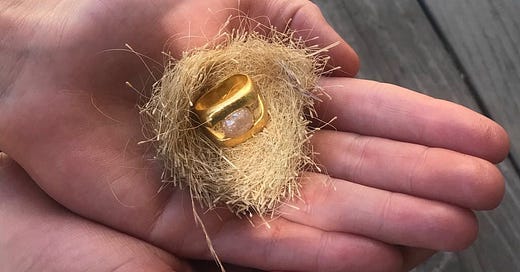I’ve been doing my research on love and God and the capitalist machine, believing versus doing, and unity, and fear. I dug around and found Erich Fromm’s The Art of Loving that I had stashed away, and as it happens he’s got most of an answer to the protest message that came to me some time ago, that is, that love is not a promise. Connecting directly from the “paradoxical character of human nature” to the “paradoxical logic” of the Tao, he shows how (as I’ve said myself) that both are true—that is, that both a feeling and a decision are necessary—and so I’d say it’s fair to say that it’s not a promise in that it’s not just a promise, which is also what I was trying to get across. Elsewhere though, even Fromm can’t help but invoke the “the promise to love each other forever,” as if that doesn’t require just this sort of dissertation.
As I see it, forever comes along just fine without a promise, and so if there’s a promise, it’s for depth, growth, truth, wonder, and to keep singing all the songs. A promise for forever sure seems like it should sound sweet, but it hits my ear like the dull gong of death itself. Me, I like the sound of “a promise made is a debt unpaid”—and you can pay me back with music, any day.
If I dig down in my costume closet for long legs and hard promises—and I’ve made more than a few—I can drag out the best of them, with or without blood, as you wish. I say that, and you know that I’m not much with words. I like to keep my promises in the infield. I’ll cut the grass, let’s say. Let me light the fire. I’ll step into the fray.
Nietzsche seems to have believed that our sovereign ability to promise is what proves that we have free will, but plenty argue quite well that our will is nowhere near as free as we want to believe. How can we claim free will when confronted with the frequently-repeated brain-wave studies where we can see that the lightning zaps across the naked meat inside your skull well before you, you bare chested fool, catches even so much as a glimpse of the spark.
How many of us can claim to control our destiny, being, as we are, less than fully free?
Our man Sam Harris spells it out—and I think rather well—how “The intention to do one thing and not another does not originate in consciousness—rather, it appears in consciousness…” And, of course, that I am not free “to do that which does not occur to me to do,” which invites the question of how things occur—and if occurring precedes willing, then which leads and which simply follows? And finally, and most of all, that our lack of free will is like a lack of hair, or the lack of a tomato in the rain, or for that matter the lack of a potato, or a train.
There is no weaker way to wonder than worrying about why, or not, we can, or cannot, decide what or who or which square or pencil to love, or not, and certainly not for how long, because for the most part—or entirely—it is beyond the pool, and our ability to promise, if at all, operates within, and not around, the infinitely larger and more beautiful forever unfolding of the unknown white sheet—the unwinding of control.
Let’s consider our promise, then, the digging that I began with—the work that we can do while we watch the days unfold.
Method Writing is a fantastic book on writing by the wonderful Jack Grapes, who also teaches writing classes using the methods he covers in his books. Highly recommended!




